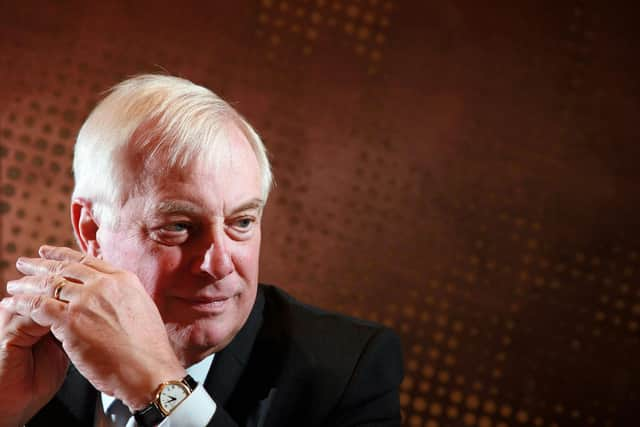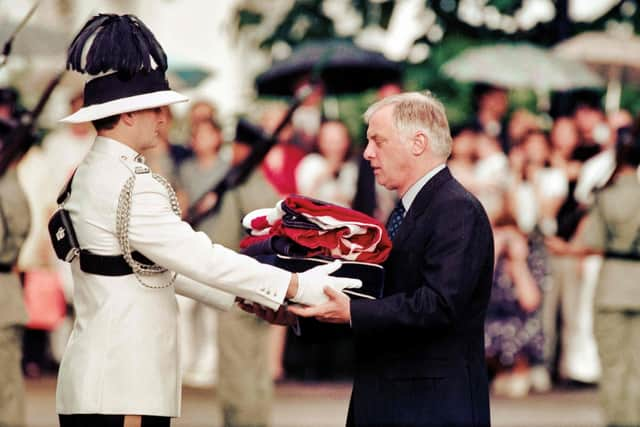'Hong Kong will remain in handcuffs with President Xi Jinping in power', warns Chris Patten
Thirty years on, Lord Patten has published the diaries he kept during his five years in Hong Kong and will be in Yorkshire next week at the Ilkley Literature Festival to discuss both the record he kept of an extraordinary moment in history and his sadness at what has transpired since.
Patten says it was during the initial Covid lockdown of 2020 that he first returned to the diaries.
Advertisement
Hide AdAdvertisement
Hide Ad“I hadn’t kept a diary before going to Hong Kong,” he explains.


“But I recognised that it was going to be rather an important moment, both in British history and in diplomacy with a growing power, China, so I started writing really slightly before I went to Hong Kong.
“For the first three years or so, I dictated the diary every week and sent the tapes back to my former PAs in London to type up. In the last two years I wrote it every day because I was starting to think that so many things were happening, some of them very funny, that I just needed to record them. So I had this pile of paper in boxes in my cellar.”
Patten had promised to give the diaries to The Bodleian library in Oxford but at the beginning of lockdown, prompted by his wife, he started to go through them himself.
Advertisement
Hide AdAdvertisement
Hide Ad“When I started reading them, I thought I really should edit this myself,” he says. “So I turned about 900,000 words into about 250,000. That's the diary. I added at the beginning a chapter about what had happened before and what happened afterwards.


“The first thing that struck me was how important a time it had been for my whole family and how I couldn't have done it without the agreement of my wife and the support of my wife.
“She was really, as one of the reviewers said, the real hero of the diaries. The extent to which there was an interconnection between my family and domestic life and these big political events was quite interesting.”
Hong Kong became a British colony in the 19th Century and was gradually built up from an area of farming and fishing villages to one of the world’s most important commercial ports and financial centres.
Advertisement
Hide AdAdvertisement
Hide AdIn 1984, China and the UK signed a joint declaration in which it was agreed the colony would be transferred in 1997 with China guaranteeing Hong Kong’s political and economic systems for 50 years after that.
Patten’s attempts during his time as governor to enact political reforms before the 1997 handover were unpopular with many in China, with one senior Chinese diplomat famously labelling him as a “sinner for a thousand years”.
While Patten greeted the criticism with equanimity - during a 2002 visit to China when asked about the remark he said “politics is politics” and praised Chinese leaders as “mature, serious, practical and far-sighted”, he takes a much dimmer view of current President Xi Jinping.
Xi, who looks set to secure a precedent-breaking third term, is regarded by Patten as no less than a “dictator”.
Advertisement
Hide AdAdvertisement
Hide AdIn 2020, China introduced a wide-ranging ‘national security law’ for Hong Kong, making it easier to prosecute protesters and reducing its political autonomy.
Hundreds of arrests have been made since with pro-democracy news outlets shut down.
The UK offered up to three million Hong Kong citizens the chance to settle in this country and ultimately apply for citizenship in response to the law which then Prime Minister Boris Johnson described as a “clear and serious breach” of the agreement reached in the 1980s.
Patten says: “When I left Hong Kong in 1997, I couldn't be entirely confident that everything would work out all right but I was moderately hopeful. Certainly for just over 10 years after we left things did go reasonably well.
Advertisement
Hide AdAdvertisement
Hide Ad“The Chinese in Beijing interfered too much. They choked back their promises on developing a system of government and democracy in Hong Kong. But it wasn't too bad.
“What changed was the selection of Xi Jinping who is now coming up with his third term in office. From the beginning he was determined to exercise greater control over the party and the party to have greater control over every aspect of life in China and that involved cracking down on civil society everywhere and involved cracking down on Hong Kong.”
Patten is downbeat on the immediate future prospects for Hong Kong.
“So long as Xi Jinping lasts I think Hong Kong will remain in handcuffs.
Advertisement
Hide AdAdvertisement
Hide Ad“But you can't think in history of dictators who've got better as they've been longer in office, because they have nobody who dares to tell them when they're getting things wrong because they quell opposition wherever they can.
“While Xi Jinping has been very successful in exercising his own personal control, he has an abysmal record on the economy, which is now getting into a real mess with the housing and construction industry turning into a sort of Ponzi scheme.
“He's also been closing China down from other countries which is bad for a country which has been so interconnected with the global economy previously. I think he's getting worse. And you can't expect the situation in Hong Kong while he's there to get any better, which is a tragedy. The Communists in Beijing have gone about demolishing Hong Kong's freedoms and the rule of law in a venomous and comprehensive way.”
Patten defends his and Britain’s handling of the transfer of power.
Advertisement
Hide AdAdvertisement
Hide Ad“There are probably things we could have done better, although when we left Hong Kong, it was like a Rolls Royce. All you had to do was turn on the ignition and it would purr off into the middle distance. Between the joint declaration in the mid 1980s and the time we left, the GDP had doubled. The fiscal reserves had increased six fold. We'd had year after year of success with cutting tax, increasing spending and putting more money into the reserves and amazing infrastructure programmes.
“It had been a great success story. But however much we'd done to try to in law or in international agreements to strengthen Hong Kong's civil society and Hong Kong's freedoms, I don't think anything could have possibly predicted what happened when Xi Jinping took over.”
After his time in Hong Kong gave him a global profile, Patten went onto a series of high-profile roles - leading the Independent Commission for Policing in Northern Ireland, working as European Commissioner for External Relations, being chairman of the BBC Trust and appointed as Chancellor of the University of Oxford.
But he is still best known for his time in Hong Kong - something Patten is more than happy with.
Advertisement
Hide AdAdvertisement
Hide AdHe says despite the political challenges, it was a very positive personal experience.
“I've been very lucky, I've done some pretty interesting jobs in my time,” he says.
“But I think the five years we spent in Hong Kong was probably the happiest time of our lives, certainly for my wife and my youngest daughter who did most of her secondary education there. It was a pity that we were separated for most of the time from our two older daughters. But certainly it was the period of my life as a public figure that I've most enjoyed.
“I guess when people write my obituary, which I hope won’t be for a bit, most of them will include a photograph of me receiving the Union flag when I left Hong Kong, or waving goodbye from HMS Britannia.
Advertisement
Hide AdAdvertisement
Hide Ad“Certainly, I think it's probably the thing for which I'm most remembered, and it's the job I most enjoyed.”
He has not been back to Hong Kong for several years, with the last time being around 2016.
“I haven’t been since then and I imagine they wouldn’t give me a visa.
“I'm sure that I will meet in Ilkley quite a few people from Hong Kong who come to this country because they don't want to live in a society which is no longer free and they're making a huge and important contribution to life in Britain.”
Chris Patten will be speaking about The Hong Kong Diaries at The King’s Hall, Ilkley on Tuesday, October 11 from 7.30pm. Tickets are available from the Ilkley Literature Festival website.